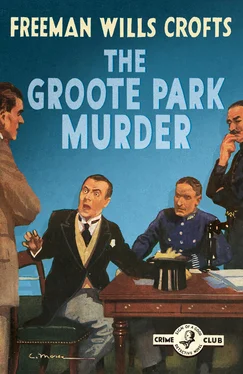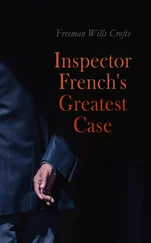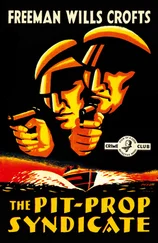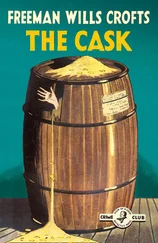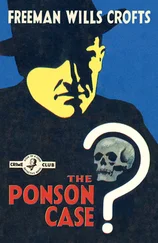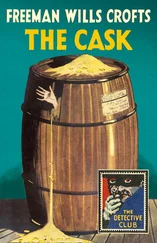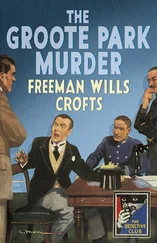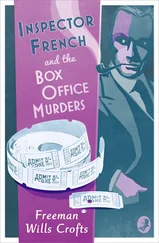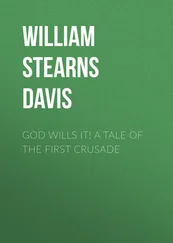Vandam metaphorically smacked his lips. When in a puzzling case he came on what he was pleased to term ‘the trail of the woman,’ he felt he was moving forward. That Smith was the kind of man these bills revealed him to be did not prove anything, but it was suggestive. A dispute over a woman! What more fruitful source of tragedy could be imagined? An obvious line of inquiry suggested itself. He must learn the identity of the woman or women in question, and find out if other suitors were in the field.
He picked up the bank book. A glance showed that the last balance had been struck a fortnight previously, when some £45 only stood to the deceased’s credit.
Smith, then, had been hard up. Not down and out, but still hard up. Though on his £400 a year he could no doubt have paid the £60 odd owing, an examination of the dates of the bills showed that so far from saving, he had been growing rapidly more extravagant during the month or two preceding his death.
‘Guess he wasn’t murdered for his money anyhow,’ Vandam thought with grim humour as he turned to the letters.
With one exception, these were commonplace enough, but as he read this one Vandam smiled with satisfaction. It was a curt note in a lady’s rather flamboyant hand, in which ‘J. L.’ assured ‘Dear Albert’ that she could not see him that night, but that he might take her out to dinner and a theatre on the following evening if he were good. The letter bore the date of a week previous, but no address. However, taken as an adjunct to the bills, it should lead speedily to the identification of the lady.
He replaced the papers in the box with the intention of taking them to headquarters, then, descending the stairs, he took leave of Mrs Regan and let himself out of the house.
‘Now for friend Holt,’ he thought, as he bent his steps towards the Central Branch of the Union Bank.
Mr Holt saw him at once. He had heard of the accident and seemed genuinely distressed by the tragic fate which had overtaken the sharer of his room. He scouted the suicide theory which Vandam put forward, saying that Smith was the last man in the world to take his own life. The Inspector’s questions he answered with the utmost readiness.
But, like the others interviewed that afternoon, he had but little to tell. He had gone to reside in Rotterdam Road about a year previously, Smith being already there. The two men, while not close friends, got on well enough together. They did not see very much of each other, as Smith was out a good deal, and their associates moved in different circles. Holt was, however, able to give the names of three men with whom Smith had been on fairly intimate terms. Vandam noted their addresses, intending to call on them next day. Generally Holt confirmed what the Inspector had already learned about the deceased’s character and habits.
‘With regard, then, to last night, Mr Holt,’ Vandam went on, ‘please tell me what occurred.’
‘Last night I was detained up town,’ the young fellow answered. ‘I did not get to my rooms until about 7.15. Smith had finished supper and was reading the paper when I went in. A word or two passed between us and then I had my supper. When I had about half finished Smith left the room, and I heard him go upstairs to his bedroom.’
‘Did you notice anything peculiar about his manner?’
‘Nothing, except that he seemed a little excited. He was restless, and kept jerking the paper about.’
‘He was quite sober?’
‘Absolutely. He seldom drank to excess.’
Vandam nodded.
‘And was that the last time you saw him?’
‘I saw him once again. When I had finished supper I went up to my room for a book, and as I opened the door he was just passing downstairs. He was carrying a small suitcase. I said, “Hallo, Smith! Going away?” “Only to spend the evening at Pendlebury,” he answered, “but if I miss the last train I shall probably stay overnight.” I went upstairs and Smith down, and that was the last I saw of him.’
Pendlebury was a residential suburb about four miles south of the city, with which it was connected by electric tram.
‘What time was that, Mr Holt?’
‘About ten minutes past eight.’
‘Smith didn’t say to whom he was paying the call?’
‘No.’
Inspector Vandam asked a good many more questions, but except that the dead man had seemed a little absent-minded off and on for some weeks past, he learned nothing further of interest.
It was too late on leaving the bank to begin another phase of the inquiry that night. Vandam, therefore, after a call at headquarters, turned homewards, and spent the evening writing up notes of what he had already done and considering his future procedure.
The inquest took place next day. It had been fixed for eleven o’clock, and Vandam spent the whole morning making his preparations and checking over the evidence of his witnesses. After a consultation, it had been decided to keep secret the fact that murder had been committed, in the hope that the assassin might be lulled into a feeling of security which would render him careless and more likely to give himself away.
The tragedy had created immense popular interest, and it was over a crowded court that the coroner was called upon to preside. Punctually to the minute he plunged into business. The jury were sworn, left to view the body, looking self-conscious and important, returned a trifle paler and obviously with less thought of their own dignity, and the taking of evidence began.
Signalman Joseph Ashe first testified as to the discovery of the body and the giving of the alarm, and from the stationmaster and the other railway officials the story of that tragic morning was told up to the arrival of the police. Inspector Vandam then swore that the body so found was that which the jury had just viewed, and Dr Bakker described the injuries.
Evidence of identification having been taken, the court was adjourned, to the surprise of everyone not in the know. The coroner stated that though certain of the details seemed to point to suicide, the police had not as yet succeeded in obtaining sufficient evidence to enable the jury to reach a finding.
The suggestion of suicide sent a thrill through those present, which was quickly succeeded by a feeling of disappointment as they realised that for the time being their curiosity must remain unsatisfied.
The inquest over, Vandam sat down to think out his next move. There were still some obvious inquiries to be made, and he decided he would get through with these at once, before pausing to take stock of his position generally.
First, there was the matter of the hammer. If he could find out where it had been sold and who had bought it, the evidence might lead him straight to his goal. Then there was the sandbag. The purchase of a strip of canvas or a sailmaker’s needle would surely be sufficiently uncommon to have attracted attention, and inquiry should bring the transaction to light. A visit to the various shops—jewellers, costumiers, florists—where Smith had made his purchases would probably lead to the identification of J. L., and if so, an entire new line of investigation would be opened up. There was also the matter of the automatic pistol found on Smith’s body. If the purchase could be traced it might be valuable. Finally, there were the inquiries into the movements of Swayne upon which the Inspector had already decided.
There was certainly no lack of clues, and Vandam saw a vista of strenuous work opening out in front of him.
He returned to headquarters and instructed Sergeant Clarke to undertake the hammer and sandbag inquiry, put another man on the automatic pistol, and set off down town himself to visit the shops.
His information came more easily than he had anticipated. Smith apparently had made no secret of his proclivities, and the Inspector soon learned that J. L. was a Miss Jane Louden, the daughter of the owner of a third-rate hotel—or rather public-house—in the poorer quarter of the town. The girl, a dark and haughty beauty, acted as barmaid, and was notoriously given to extracting purple and fine linen from the particular specimen of mankind whom she held in subjection for the time being. She had usually visited the shops with Smith, and had chosen the articles that appealed to her fancy. From the dates of the purchases it appeared that Smith had been a victim for over six months.
Читать дальше
